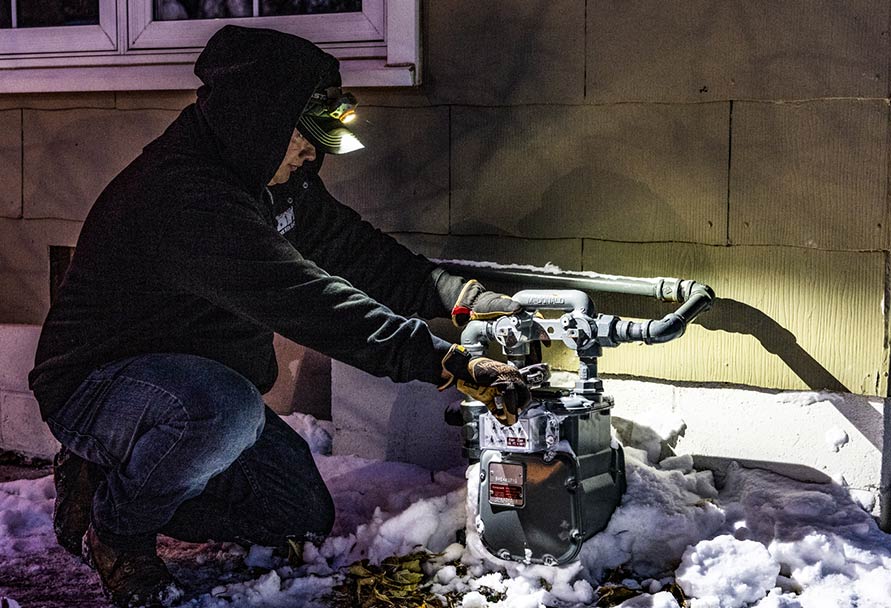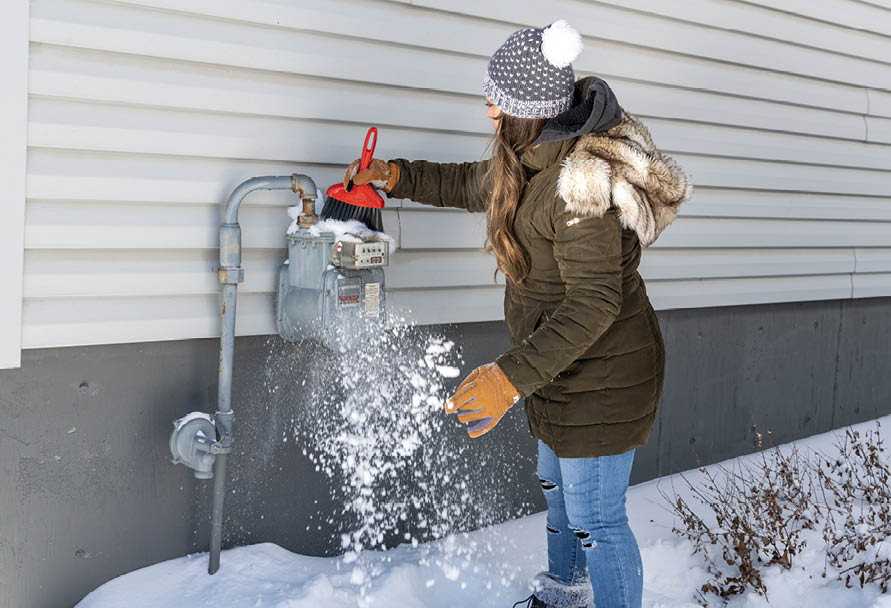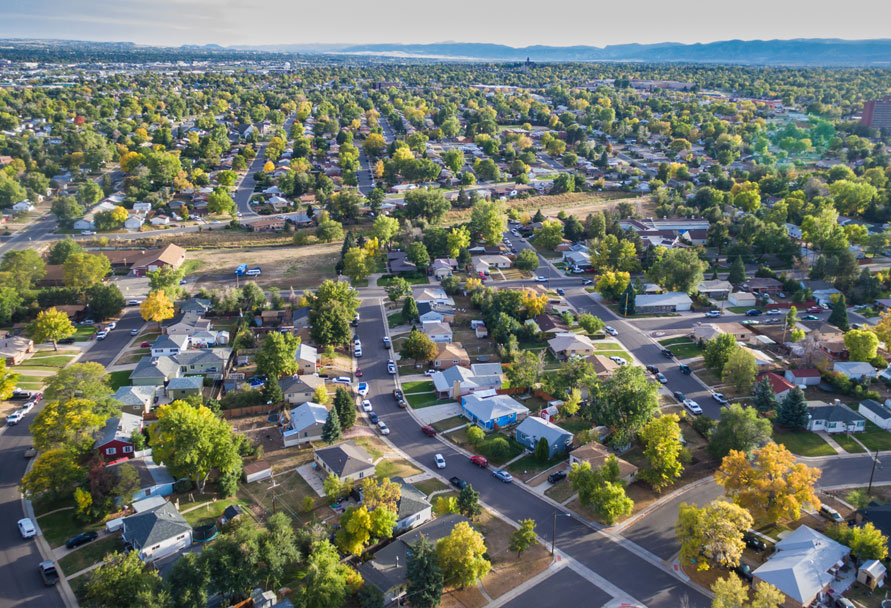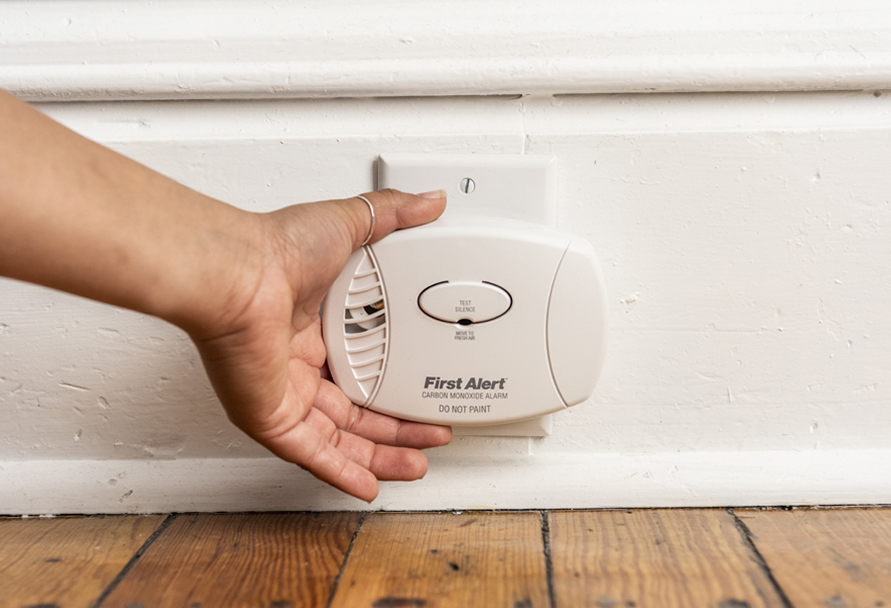Natural gas safety

If you smell a gas odor, immediately evacuate from the building or area. Once you're away from the building, call 911.
We deliver safe, reliable and sustainable natural gas to your home or business through a system of underground pipelines. While natural gas has an excellent safety record, it’s important to know a few basic principles to stay safe.
Keep your gas meter clear
From summer to winter, the different seasons can be rough on your home’s gas meter. Whether it’s by clearing away branches or breaking off icicles, there are different steps you can take to guarantee your meter is always clear and you have a safe path to the meter for service visits, safety inspections and emergency situations.
- Clear away any broken tree limbs or branches that may have fallen during snow or wind storms.
- Trim tall grass and weeds that have grown around the gas meter. Make sure the natural gas exhaust and air intake areas are also free of debris to prevent the risk of CO building up inside your home.
- As the leaves begin to fall, remove them from around the gas meter, as well as the gas exhaust and air intakes.
- Carefully use your hand, a brush or a broom to remove ice and snow that may have fallen during storms. Do not use a shovel to do this.
- Do not use sharp objects, salt, ice melting chemicals or hot water to remove snow and ice.
- Remove icicles hanging from the roof above your gas meter.
- Shovel a path to your meter in case of the need for emergency access or service visit.
Keeping your gas meter clean and secure helps to guarantee that it can function properly to keep the heat on, keep your appliances running efficiently and keep you safe.

Natural gas service restoration process
When your service has been disrupted the restoration process works like this:
- To safely facilitate the repair process technicians will go door to door and turn off the gas meter at each affected home.
- We will make any necessary repairs to the natural gas distribution system or coordinate with suppliers if the issue is unrelated to our local natural gas distribution system.
- Following repairs, technicians will repressurize and test the natural gas system.
- Once service is restored, technicians will turn each meter on, enter the home or business to perform a safety inspection of all natural gas equipment and relight all pilot lights. Someone over the age of 18 must be present.
- If someone over the age of 18 is not present meters will be left off and a door tag will be left behind with further instructions.
Excess flow valves
An excess flow valve, or EFV, is a mechanical safety device installed on the underground gas service line between the gas main and a Black Hills Energy gas meter. It is designed to minimize the flow of natural gas in the event of a service line break. A potential safety benefit if a service line is damaged or severed by third party excavation damage, ground movement or natural disasters, the EFV will automatically close and significantly restrict the flow of gas. This is a similar concept to an electric circuit breaker tripping when it exceeds its design limits.
Bleed-by Safety Awareness: It is important to note that an EFV does not completely shut off the flow of gas when tripped. A very small, predetermined amount of gas will “bleed by” per code requirements and by manufacturers’ specified closure flow rates. The gas may not be escaping under full pressure, but there will typically be enough gas to cause a gas odor, indicating there is a problem. Also, the end user will be alerted that there will be no gas service. By restricting the flow of gas, an EFV reduces the potential for explosions, fires, and personal injury. If gas odor is inside a structure, evacuate immediately and call 911.
Installation details
EFVs do not operate on all gas service lines, and certain parameters may exist where installation of an EFV is not warranted. Many customers already have an EFV installed on their existing service line. If you are interested in getting an EFV installed, we first need to determine if your gas service line is eligible.
Please contact us at 888-890-5554 if you’d like to have an EFV installed. Depending on the regulatory rules in your state or our approved operating terms and conditions, you may be responsible for the cost of installing the EFV. The average cost is $1,000 but varies by difficulty of installation. We can provide a cost estimate at your request.
Installation requires safe digging notification and excavation where the existing gas service line connects to the gas distribution main. During installation, your gas service will be interrupted. If you decide you’d like an EFV and are eligible for one, we’ll install the device on a mutually agreeable date.
Installing an EFV doesn’t protect against leaks that may happen in your house or small puncture leaks on your service line or on your above-ground meter set. EFVs are designed to actuate or trip when a predetermined flow rate over your normal gas load has been exceeded. If there is no flow or leaks, or flow is within normal gas loads, the EFV will not activate.
If gas odor is inside a structure, evacuate immediately and call 911.
Although an EFV may limit the damage caused by such an incident, the best way to prevent one is to make sure those who are digging on your property call 811 first.
More information
We’ve installed EFVs on most new or replaced services lines built since 2008. If you want to find out if you already have an EFV, call us at 888-890-5554.


